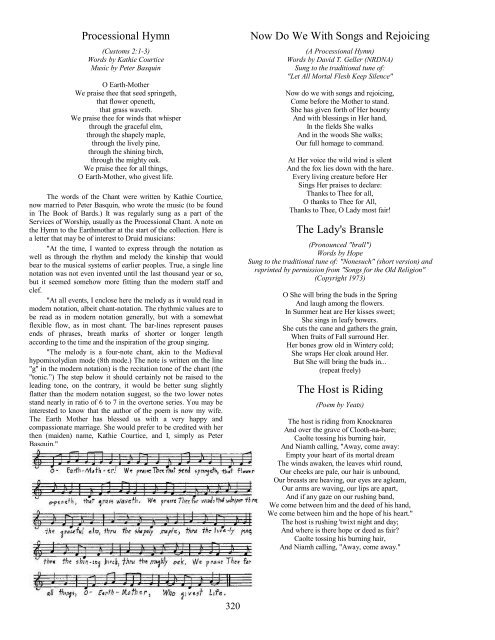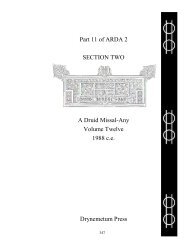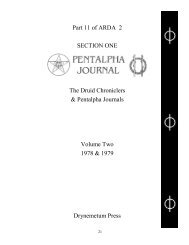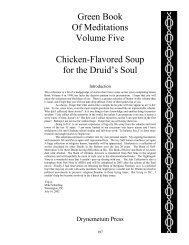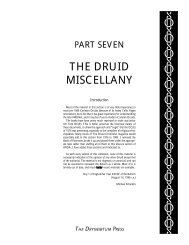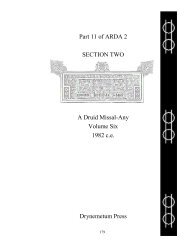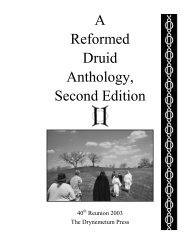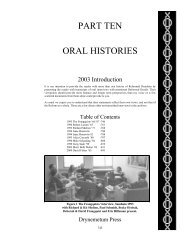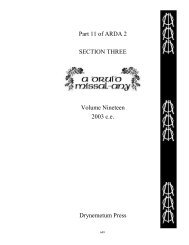Green Book Of Meditations Volume 6 The Books of Songs - Student ...
Green Book Of Meditations Volume 6 The Books of Songs - Student ...
Green Book Of Meditations Volume 6 The Books of Songs - Student ...
Create successful ePaper yourself
Turn your PDF publications into a flip-book with our unique Google optimized e-Paper software.
Processional Hymn<br />
(Customs 2:1-3)<br />
Words by Kathie Courtice<br />
Music by Peter Basquin<br />
O Earth-Mother<br />
We praise thee that seed springeth,<br />
that flower openeth,<br />
that grass waveth.<br />
We praise thee for winds that whisper<br />
through the graceful elm,<br />
through the shapely maple,<br />
through the lively pine,<br />
through the shining birch,<br />
through the mighty oak.<br />
We praise thee for all things,<br />
O Earth-Mother, who givest life.<br />
<strong>The</strong> words <strong>of</strong> the Chant were written by Kathie Courtice,<br />
now married to Peter Basquin, who wrote the music (to be found<br />
in <strong>The</strong> <strong>Book</strong> <strong>of</strong> Bards.) It was regularly sung as a part <strong>of</strong> the<br />
Services <strong>of</strong> Worship, usually as the Processional Chant. A note on<br />
the Hymn to the Earthmother at the start <strong>of</strong> the collection. Here is<br />
a letter that may be <strong>of</strong> interest to Druid musicians:<br />
"At the time, I wanted to express through the notation as<br />
well as through the rhythm and melody the kinship that would<br />
bear to the musical systems <strong>of</strong> earlier peoples. True, a single line<br />
notation was not even invented until the last thousand year or so,<br />
but it seemed somehow more fitting than the modern staff and<br />
clef.<br />
"At all events, I enclose here the melody as it would read in<br />
modern notation, albeit chant-notation. <strong>The</strong> rhythmic values are to<br />
be read as in modern notation generally, but with a somewhat<br />
flexible flow, as in most chant. <strong>The</strong> bar-lines represent pauses<br />
ends <strong>of</strong> phrases, breath marks <strong>of</strong> shorter or longer length<br />
according to the time and the inspiration <strong>of</strong> the group singing.<br />
"<strong>The</strong> melody is a four-note chant, akin to the Medieval<br />
hypomixolydian mode (8th mode.) <strong>The</strong> note is written on the line<br />
"g" in the modern notation) is the recitation tone <strong>of</strong> the chant (the<br />
"tonic.”) <strong>The</strong> step below it should certainly not be raised to the<br />
leading tone, on the contrary, it would be better sung slightly<br />
flatter than the modern notation suggest, so the two lower notes<br />
stand nearly in ratio <strong>of</strong> 6 to 7 in the overtone series. You may be<br />
interested to know that the author <strong>of</strong> the poem is now my wife.<br />
<strong>The</strong> Earth Mother has blessed us with a very happy and<br />
compassionate marriage. She would prefer to be credited with her<br />
then (maiden) name, Kathie Courtice, and I, simply as Peter<br />
Basquin."<br />
320<br />
Now Do We With <strong>Songs</strong> and Rejoicing<br />
(A Processional Hymn)<br />
Words by David T. Geller (NRDNA)<br />
Sung to the traditional tune <strong>of</strong>:<br />
"Let All Mortal Flesh Keep Silence"<br />
Now do we with songs and rejoicing,<br />
Come before the Mother to stand.<br />
She has given forth <strong>of</strong> Her bounty<br />
And with blessings in Her hand,<br />
In the fields She walks<br />
And in the woods She walks;<br />
Our full homage to command.<br />
At Her voice the wild wind is silent<br />
And the fox lies down with the hare.<br />
Every living creature before Her<br />
Sings Her praises to declare:<br />
Thanks to <strong>The</strong>e for all,<br />
O thanks to <strong>The</strong>e for All,<br />
Thanks to <strong>The</strong>e, O Lady most fair!<br />
<strong>The</strong> Lady's Bransle<br />
(Pronounced "brall")<br />
Words by Hope<br />
Sung to the traditional tune <strong>of</strong>: "Nonesuch" (short version) and<br />
reprinted by permission from "<strong>Songs</strong> for the Old Religion"<br />
(Copyright 1973)<br />
O She will bring the buds in the Spring<br />
And laugh among the flowers.<br />
In Summer heat are Her kisses sweet;<br />
She sings in leafy bowers.<br />
She cuts the cane and gathers the grain,<br />
When fruits <strong>of</strong> Fall surround Her.<br />
Her bones grow old in Wintery cold;<br />
She wraps Her cloak around Her.<br />
But She will bring the buds in...<br />
(repeat freely)<br />
<strong>The</strong> Host is Riding<br />
(Poem by Yeats)<br />
<strong>The</strong> host is riding from Knocknarea<br />
And over the grave <strong>of</strong> Clooth-na-bare;<br />
Caolte tossing his burning hair,<br />
And Niamh calling, "Away, come away:<br />
Empty your heart <strong>of</strong> its mortal dream<br />
<strong>The</strong> winds awaken, the leaves whirl round,<br />
Our cheeks are pale, our hair is unbound,<br />
Our breasts are heaving, our eyes are agleam,<br />
Our arms are waving, our lips are apart,<br />
And if any gaze on our rushing band,<br />
We come between him and the deed <strong>of</strong> his hand,<br />
We come between him and the hope <strong>of</strong> his heart."<br />
<strong>The</strong> host is rushing 'twixt night and day;<br />
And where is there hope or deed as fair?<br />
Caolte tossing his burning hair,<br />
And Niamh calling, "Away, come away."


